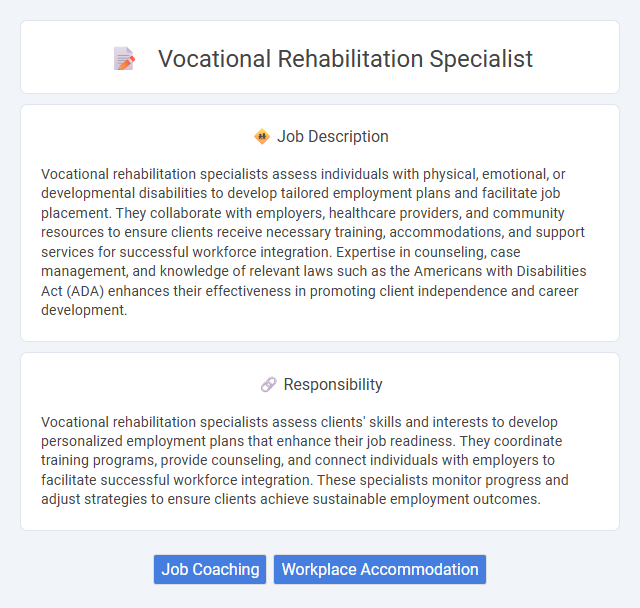
Vocational rehabilitation specialists assess individuals with physical, emotional, or developmental disabilities to develop tailored employment plans and facilitate job placement. They collaborate with employers, healthcare providers, and community resources to ensure clients receive necessary training, accommodations, and support services for successful workforce integration. Expertise in counseling, case management, and knowledge of relevant laws such as the Americans with Disabilities Act (ADA) enhances their effectiveness in promoting client independence and career development.
Vocational rehabilitation specialists likely work best with individuals experiencing physical, mental, or emotional disabilities who require tailored support to re-enter the workforce. Those with strong empathy, problem-solving skills, and patience may prove more suitable for effectively assisting clients in overcoming barriers. Individuals uncomfortable with counseling or unable to handle complex cases might find this role challenging or less fitting to their strengths.
Qualification
Vocational rehabilitation specialists typically require a bachelor's degree in rehabilitation counseling, psychology, social work, or a related field, with many employers preferring a master's degree in rehabilitation counseling or vocational rehabilitation. Certification from the Commission on Rehabilitation Counselor Certification (CRCC) enhances job prospects and validates expertise in assessing client strengths, developing career plans, and facilitating job placement. Strong communication skills, knowledge of assistive technology, and experience with vocational assessments are essential qualifications for effectively supporting individuals with disabilities in achieving employment goals.
Responsibility
Vocational rehabilitation specialists assess clients' skills and interests to develop personalized employment plans that enhance their job readiness. They coordinate training programs, provide counseling, and connect individuals with employers to facilitate successful workforce integration. These specialists monitor progress and adjust strategies to ensure clients achieve sustainable employment outcomes.
Benefit
A vocational rehabilitation specialist likely helps individuals with disabilities or injuries regain skills necessary for employment, increasing their chances of financial independence. They probably improve clients' self-confidence and social integration by providing personalized job training and support. The role may offer the benefit of making a meaningful difference in people's lives while fostering personal and professional growth.
Challenge
Vocational rehabilitation specialists likely face challenges in effectively assessing clients' unique abilities and limitations to develop personalized employment plans. They probably encounter obstacles when coordinating with healthcare providers, employers, and insurance companies to ensure seamless service delivery. Adapting to rapidly changing labor market conditions and integrating new technologies may also present ongoing difficulties in this role.
Career Advancement
Vocational rehabilitation specialists can advance their careers by obtaining certifications such as the Certified Rehabilitation Counselor (CRC) credential, which enhances professional credibility and job prospects. Gaining specialized knowledge in areas like mental health or substance abuse rehabilitation increases opportunities for promotion to senior case manager or program coordinator roles. Pursuing advanced degrees, such as a master's in rehabilitation counseling or social work, also facilitates leadership positions and higher salary potential within government agencies, healthcare settings, or private rehabilitation firms.
Key Terms
Job Coaching
Vocational rehabilitation specialists provide job coaching to individuals with disabilities, helping them develop essential workplace skills and adapt to job requirements. They assess clients' strengths and challenges, create personalized employment plans, and offer ongoing support to ensure successful job placement and retention. Effective job coaching focuses on enhancing communication, task management, and workplace integration to improve client independence and productivity.
Workplace Accommodation
Vocational rehabilitation specialists assess individual needs and coordinate workplace accommodations to enhance employee productivity and accessibility. They develop customized adjustments such as ergonomic workstations, assistive technologies, and flexible scheduling to support employees with disabilities. Expertise in ADA compliance and occupational therapy principles ensures optimal integration of accommodations within diverse work environments.
 kuljobs.com
kuljobs.com